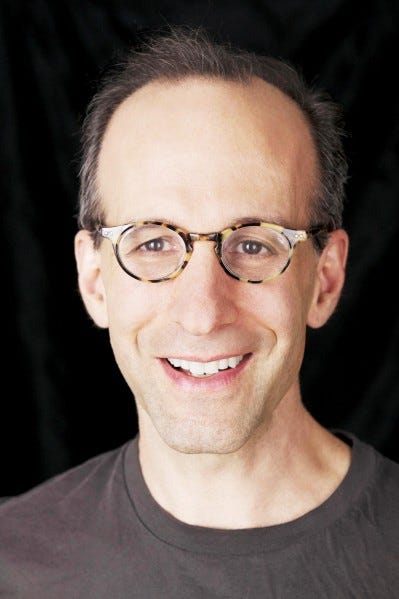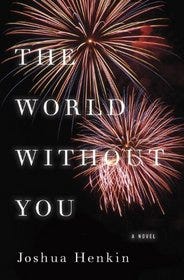interviews
Interview with Joshua Henkin, Author of The World Without You

by Julia Jackson

Joshua Henkin may have been the director of the MFA program that I attended, but I’m certain that even if I never had the ability to get to know and thus respect him as a teacher and mentor, I would still love his new book, The World Without You. The novel is both sprawling and concise: it enters multiple peoples’ points of view and travels around the world, while also taking place over a mere holiday weekend and focusing on a single family. It is impressive in its ability to succeed at both, but the thing that makes the book truly memorable is its heart. Good fiction should tackle multiple emotions, emotions that contradict and conflict with each other, and The World Without You demonstrates this with Henkin’s sleek mastery of both language and storytelling.
Henkin is currently in the middle of his book tour, but was able to answer a few questions for us via e-mail. Here’s what he had to say about process, craft, and what it’s like to play the role of MFA department chair, family man, and acclaimed novelist all at once.
Julia Jackson: I know you work at the Brooklyn Writers Space. How does it benefit you to work in a place like that, besides denying yourself access to the internet?
Joshua Henkin: Far and away, the most important thing is denying myself access to the internet. But there are other benefits too, such as getting dressed in the morning and going out into the world and feeling as if you have a job, which is an important thing for a writer to feel.
JJ: What is good fiction and good writing to you?
JH: It’s like what Justice Potter Stewart said about pornography — I don’t know how to define it, but I know it when I see it. There are different kinds of good writing, but in general I’m drawn to writing that has a real voice and that takes character seriously. I’m all for a lovely sentence (language, after all, is all a writer has), but it must be a lovely sentence in pursuit of something greater than itself.
JJ: Similarly, what do you look for from your graduate school applicants? It seems like it might be a bit tricky to scout out the more latent, unpolished talent.
JH: I look for work that sings. It’s less the latent, unpolished talent that’s hard to scout out than the work that’s utterly competent but that doesn’t have soul. But in the end, the right decision announces itself. We have a pretty diverse range of aesthetics on our committee, and yet year after year there’s real consensus on whom we want.
JJ: Publisher’s Weekly called The World Without You “a less chilly variation on The Corrections,” which is a description that I don’t find to be inaccurate. Did you have Franzen’s two most recent novels in the back of your mind as you wrote this book? Was there anything in these books that you wanted to emulate, or avoid?
JH: I actually haven’t read Freedom yet, though it’s rising quickly in my bedside pile. I liked The Corrections a lot. And, yes, at least subconsciously The Corrections was probably on my mind when I was writing The World Without You. There’s a certain structural similarity — both books involve various family members, each with his or her own story, convening as a group, and both are family dramas. Perhaps even more, I was thinking about Rick Moody’s The Ice Storm, which, like The World Without You, takes place in compressed time over a single holiday (Thanksgiving, in the case of The Ice Storm) and, like The World Without You, appears to be told in multiple points of view. I say “appears to” because the point of view In The Ice Storm isn’t as it first seems.
JJ: One thing that struck me as I was reading the book was how each of the characters’ names seemed to fit them so perfectly. Personally, names are a tough one for me –one of those details that are small, yet so important. How important are names to you? How do you choose them?

JH: I believe it was Robert Cohen, a writer I very much admire, who wrote an essay about how he was stuck on his new novel because he couldn’t come up with the right name for his character. That rings true to me. It’s so obvious it almost doesn’t need saying that the name Jane evokes something different from the name Brittany, just as Cornelius has a different ring from Jim. I went back and forth on Nathaniel’s name. First he was Gabriel, then he was something else, and finally I settled on Nathaniel. My wife and I have a baby-naming book that we used to name real humans, and now that we’re done doing that, I use it to name my imaginary humans.
JJ: The choice to have Leo die in the way that he did seems like an interesting — and wise — one. Obviously, it loads a lot more tension into the scene, adding the element of the public death versus the private nature of mourning, as well as the political overtones that further alienate Noelle from the rest of the Frankels. When did it become obvious to you that Leo needed to die this way? Did you consider any other causes of death?
JH: I knew from the start that I wanted him to die suddenly — that this wasn’t going to be a death for which there was a lot of time to prepare. I suppose I could have had him get killed in a car crash, but that seemed a little banal. In any case, as soon as I started to write the characters and realized that many of them were political (Marilyn and Lily go down to Florida for the Bush-Gore recount, and they take off time from work to campaign for Kerry; Noelle, as you imply, is a Bush supporter), I realized that this was how he should die — that the book would be enriched by my having him be a journalist killed in Iraq.
JJ: Telling the story from an entirely omniscient, third person point of view seems like it was the right choice for this story, yet is also seems like a decision that was difficult to manage. Was the novel always structured this way? Were there any characters that were particularly easy — or difficult — to write from?
JH: My last novel, Matrimony, took place over twenty years, and I knew I wanted to write a different book this time, one that was set in compressed time and space and that was more sprawling in terms of point of view. But I didn’t realize quite how sprawling the point of view would become. I initially saw the book as taking place principally between Marilyn and Thisbe, driven by the tension between mother-in-law and daughter-in-law, by the different ways in which they grieve. But then I started to write the three sisters, and I realized the book was much more of a group novel, that there wasn’t a single protagonist and a single antagonist. As for which characters were harder to write, they were all hard to write. Nothing in fiction is easy. Most of the time it seems pretty near impossible.
JJ: When teaching, you would tell us that we needed to go somewhere that was emotionally risky and true for us in order to write good fiction. I agree that this is important, but how do you personally know once you’ve arrived there?
JH: If you have butterflies in your stomach when you write, if you start to feel ill, that’s a good sign.
JJ: I remember that during the Slice Literary Conference, I saw you during lunch and you were looking for a quiet room to spend the break to write. I think you had a revision due for the novel, but still, I was impressed by your ability to get writing done under any circumstances. For me, I have to get into “the zone” to write, and that takes time, and often quite a bit of privacy, too. Have you always been able to transition so easily from Real Life Josh to Writer Josh, or was this a skill you had to learn from necessity?
JH: Back when I was in graduate school, and even after that, I was the laziest writer around. I needed the right space, the right time, the right pen, the right lighting. But having two kids and running an MFA program disabuses you of that. If you don’t write whenever you can you’re not going to write at all.
JJ: Have you read anything super inspiring or life-changing recently?
JH: I’ve been recommending Tom McNeal’s wonderful novel To Be Sung Underwater and Maile Meloy’s story collection Both Ways is the Only Way I Want It. The first story in that collection, “Travis, B.,” is a near-perfect story as far as I’m concerned.
JJ: Do you have any idea what you’re going to work on next?
JH: I promised myself I would go back to writing short stories. It’s weird, I’ve spent the last nearly twenty years writing novels, when in so many ways I think of myself as a short-story writer. It was certainly my first love, and because I teach MFA students, I spend a lot of time reading and thinking about short stories. So last fall, when I finished The World Without You, I immediately sat down to write a short story, and the draft I wrote was 113 pages along! And then the second short story I wrote was over 200 pages long! I still think I’m capable of writing a regular old twenty-to-thirty-page story, but we’ll have to see. In the meantime, I’m tossing around some ideas for a new novel, but it’s still in the very early, incubating stages, so I’m not saying more than that.
***
— Joshua Henkin is the author of the novels Matrimony, a New York Times Notable Book, and Swimming Across the Hudson, a Los Angeles Times Notable Book, and, most recently, The World Without You. His short stories have been published widely, cited for distinction in Best American Short Stories and broadcast on NPR’s “Selected Shorts.” He lives in Brooklyn, NY, and directs the MFA program in Fiction Writing at Brooklyn College.
— Julia Jackson lives and writes in Southern California. She is the Contributing Editor for The Outlet.









